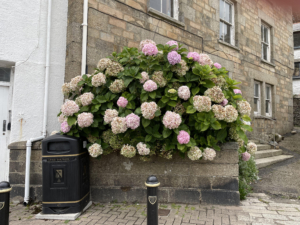Gardens Galore! – October 2024 Newsletter

Cornwall is perfect for gardens, and for people who love gardens – whether you like to plant and prune, or just stroll and admire others’ hard work. A branch of the Gulf Stream keeps Cornwall warmer than its latitude’s normal temperatures. The surroundings seas moderate the climate, while the fine mist drifting in from the sea (called mizzle) brings in humidity to keep plants and soil – and pretty much everything – damp. Yes, Cornwall gets more rain than most of Britain – but then, gardeners don’t have to water as often!
Another advantage is that Cornwall was home to a lot of wealthy aristocrats in the 18th and 19th centuries, when international commerce and growing scientific inquiry led to a boom in botanical collecting. Having interesting plants from odd places was a sign of status. Cornwall estate gardens can boast monkey puzzle trees (native to Chile and Argentina), camellias (native to Asia), rhododendrons (from both Asia and North America), and lime trees (native to Southeast Asia and the Middle East).
Traveling on Dacey’s Cornish Tours with David will take you to some of Cornwall’s greatest gardens – the formal and woodland gardens at Lanhydrock House and Prideaux House, the fabulous variety of landscapes at the Lost Gardens of Heligan (including Britain’s only outdoor jungle!), and the unexpected gardens at St. Michael’s Mount. (Not to leave out the exotic biospheres of The Eden Project!) Azaleas 15 feet high … rhododendrons the size of a house … palm trees among the conifers! Fortunately, many of these gardens also offer Cornish cream tea to revive you after all that walking.
 Another great pleasure is just the wealth of green and color. The gently rolling landscape of southeastern Cornwall – green pastures and gleaming yellow rape fields – is broken up by the lines of Cornish hedges, stone walls that have been completely overgrown by trees, shrubs, and grasses.
Another great pleasure is just the wealth of green and color. The gently rolling landscape of southeastern Cornwall – green pastures and gleaming yellow rape fields – is broken up by the lines of Cornish hedges, stone walls that have been completely overgrown by trees, shrubs, and grasses.
Along Cornwall’s rugged north coast, the stiff salt winds challenge gardeners. Here, though, clearing the stony soil provides material for freeform stone walls around every yard and lining every road – basically, tiny rock gardens everywhere. Rosemary, catmint, verbena, Cornish daisies, and rugosa roses may be small but they are tough enough to take hold and provide color and scent as you walk through Cornish villages and byways. Enjoy!
# # #

Leave a Reply